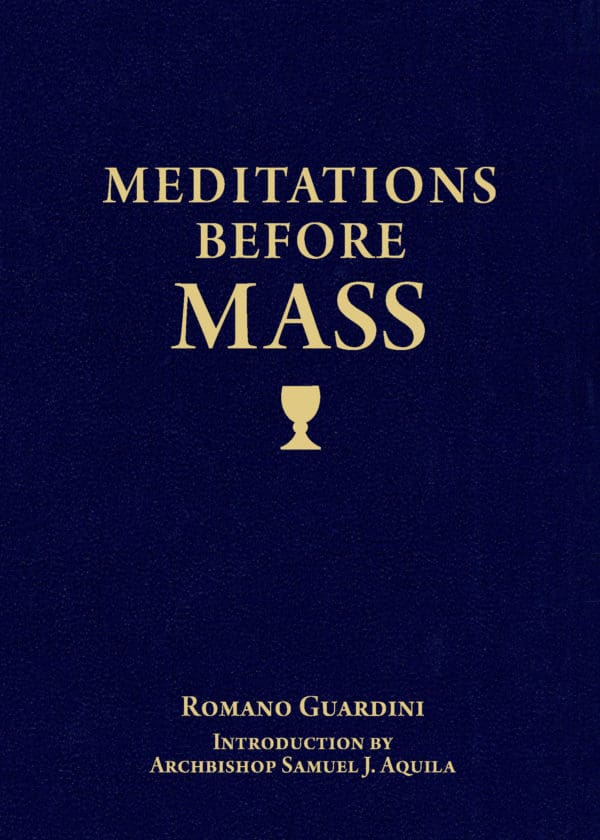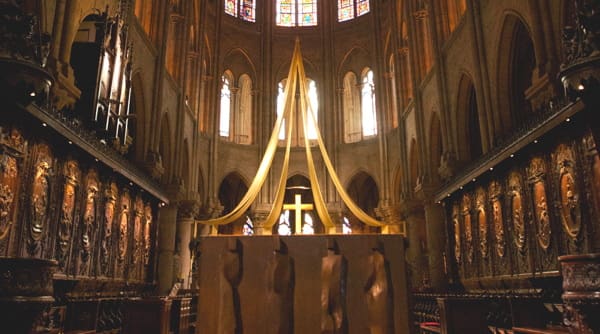When Holy Mass is properly celebrated there are moments in which the voices of both priest and faithful become silent. The priest continues to officiate as the rubrics indicate, speaking very softly or refraining from vocal prayer; the congregation follows in watchful, prayerful participation. What do these intervals of quiet signify? What must we do with them? What does stillness really imply?
It implies above all that speech end and silence prevail, that no other sounds — of movements, of turning pages, of coughing and throat-clearing — be audible. There is no need to exaggerate. Men live, and living things move; a forced outward conformity is no better than restlessness. Nevertheless, stillness is still, and it comes only if seriously desired. If we value it, it brings us joy; if not, discomfort. People are often heard to say: “But I can’t help coughing” or “I can’t kneel quietly”; yet once stirred by a concert or lecture they forget all about coughing and fidgeting. That stillness proper to the most beautiful things in existence dominates, a quiet area of attentiveness in which the beautiful and truly important reign. We must earnestly desire stillness and be willing to give something for it; then it will be ours. Once we have experienced it, we will be astounded that we were able to live without it.
Moreover, stillness must not be superficial, as it is when there is neither speaking nor squirming; our thoughts, our feelings, our hearts must also find repose. Then genuine stillness permeates us, spreading ever deeper through the seemingly plumbless world within.
Once we try to achieve such profound stillness, we realize that it cannot be accomplished all at once. The mere desire for it is not enough; we must practice it. The minutes before Holy Mass are best; but in order to have them for genuine preparation we must arrive early. They are not a time for gazing or for daydreaming or for unnecessary thumbing of pages, but for inwardly collecting and calming ourselves. It would be still better to begin on our way to church. After all, we are going to a sacred celebration. Why not let the way there be an exercise in composure, a kind of overture to what is to come? I would even suggest that preparation for holy stillness really begins the day before. Liturgically, Saturday evening already belongs to the Sunday. If — for instance, after suitable reading — we were to collect ourselves for a brief period of composure, its effects the next day would be evident.
Thus far we have discussed stillness negatively: no speech, no sound. But it is much more than the absence of these, a mere gap, as it were, between words and sounds: stillness itself is something positive. Of course we must be able to appreciate it as such. There is sometimes a pause in the midst of a lecture or a service or some public function. Almost invariably someone promptly coughs or clears his throat. He is experiencing stillness as a breach in the unwinding road of speech and sound, which he attempts to fill with something, anything. For him the stillness was only a lacuna, a void that gave him a sense of disorder and discomfort. Actually, it is something rich and brimming.
Stillness is the tranquillity of the inner life, the quiet at the depths of its hidden stream. It is a collected, total presence, a being all there, receptive, alert, ready. There is nothing inert or oppressive about it.
Attentiveness — that is the clue to the stillness in question, the stillness before God.
What then is a church? It is, to be sure, a building having walls, pillars, space. But these express only part of the word church, its shell. When we say that Holy Mass is celebrated “in church,” we are including something more: the congregation. Congregation, not merely people. Churchgoers arriving, sitting, or kneeling in pews are not necessarily a congregation; they can be simply a roomful of more or less pious individuals. Congregation is formed only when those individuals are present not only corporally but also spiritually, when they have contacted one another in prayer and step together into the spiritual “space” around them; strictly speaking, when they have first widened and heightened that space by prayer. Then true congregation comes into being, which, along with the building that is its architectural expression, forms the vital church in which the sacred act is accomplished.
All this takes place only in stillness; out of stillness grows the real sanctuary. It is important to understand this. Church buildings may be lost or destroyed; then everything depends on whether the faithful are capable of forming congregations that erect indestructible “churches” wherever they happen to find themselves, no matter how poor or dreary their quarters. We must learn and practice the art of constructing spiritual cathedrals.
We cannot take stillness too seriously. Not for nothing do these reflections on the Liturgy open with it. If someone were to ask me what the liturgical life begins with, I should answer: with learning stillness. Without it, everything remains superficial, vain. Our understanding of stillness is nothing strange or aesthetic. Were we to approach stillness on the level of aesthetics — of mere withdrawal into the ego — we should spoil everything. What we are striving for is something very grave, very important, and unfortunately sorely neglected: the prerequisite of the liturgical holy act.
Silence and the Word
We have discussed stillness in the presence of God. Only in such stillness, it was contended, can the congregation fundamental to the sacred ritual come into being. Only in stillness can the room in which Holy Mass is celebrated be exalted into a church. Hence the beginning of divine service is the creation of stillness. Stillness is intimately related to speech and the word.
The word is a thing of mystery, so volatile that it vanishes almost on the lip, yet so powerful that it decides fates and determines the meaning of existence. A frail structure shaped by fleeting sound, it yet contains the eternal: truth. Words come from within, rising as sounds fashioned by the organs of a man’s body, as expressions of his heart and spirit. He utters them, yet he does not create them, for they already existed independently of him. One word is related to another; together they form the great unity of language, that empire of truth-forms in which a man lives.
The living word arranges itself onion-like in various layers. The outermost is that of simple communication: news or a command. These can be conveyed artificially, as they often are, by the printed word or by some sound-apparatus that reproduces human speech. The syllables thus produced draw their significance from genuine language, and they answer specific needs well enough. But this superficial, often mechanical, level of words is not yet true speech, which exists only in proportion to the amount of inner conviction carried over from the speaker to that which is spoken. The more clearly his meaning is embodied in intelligible sounds, and the more fully his heart is able to express itself, the more truly does his speech become living word.
The inmost spirit lives by truth, by its recognition of what is and what has value. Man expresses this truth in words. The more fully he recognizes it, the better his speech and the richer his words. But truth can be recognized only from silence. The constant talker will never, or at least rarely, grasp truth. Of course even he must experience some truths; otherwise he could not exist. He does notice certain facts, observe certain relations, draw conclusions and make plans. But he does not yet possess genuine truth, which comes into being only when the essence of an object, the significance of a relation, and what is valid and eternal in this world reveal themselves. This requires the spaciousness, freedom, and pure receptiveness of that inner “clean-swept room” which silence alone can create. The constant talker knows no such room within himself; hence he cannot know truth. Truth, and consequently the reality of speech, depends upon the speaker’s ability to speak and to be silent in turn.
But what of fervor, which lives on emotion and emotion’s evaluation of the costliness and significance of things? Doesn’t fervor flow more abundantly into speech the more immediate the experience behind it? And doesn’t that immediacy remain greatest the less one stops to think? That is true, at least for the moment. But it is also true that the person who talks constantly grows empty, and his emptiness is not only momentary. Feelings that are always promptly poured out in words are soon exhausted. The heart incapable of storing anything, of withdrawing into itself, cannot thrive. Like a field that must constantly produce, it is soon impoverished.
Only the word that emerges from silence is substantial and powerful. To be effective it must first find its way into open speech, although this is not necessary for some truths: those inexpressible depths of comprehension of one’s self, of others, and of God. For these the experienced but unspoken suffices. For all others, however, the interior word must become exterior. Just as there exists a perverted variety of speech — talk — there exists also a perverted silence — dumbness. Dumbness is just as bad as garrulity. It occurs when silence, sealed in the dungeon of a heart that has no outlet, becomes cramped and oppressive. The word breaks open the stronghold. It carries light into the darkness and frees what has been held captive.
Speech enables a man to account for himself and the world and to overcome both. It indicates his place among others and in history. It liberates. Silence and speech belong together. The one presupposes the other. Together they form a unit in which the vital man exists, and the discovery of that unit’s namelessness is strangely beautiful. We do know this: man’s essence is enclosed in the sphere of silence/speech just as the whole earthly life is enclosed in that of light/darkness, day/night.
Consequently, even for the sake of speech we must practice silence. To a large extent the Liturgy consists of words that we address to and receive from God. They must not degenerate into mere talk, which is the fate of all words, even the profoundest and holiest, when they are spoken improperly. In the words of the Liturgy, the truth of God and of redeemed man is meant to blaze. In them the heart of Christ — in whom the Father’s love lives — and the hearts of His followers must find their full expression. Through the liturgical word our inwardness passes over into the realm of sacred openness which the congregation and its mystery create before God. Even God’s holy mystery — which was entrusted by Christ to His followers when He said, “As often as you shall do these things, in memory of me shall you do them” — is renewed through the medium of human words.
All this, then, must find room in the words of the Liturgy. They must be broad and calm and full of inner knowledge, which they are only when they spring from silence. The importance of silence for the sacred celebration cannot be overstressed — silence which prepares for it as well as that silence which establishes itself again and again during the ceremony. Silence opens the inner fount from which the word rises.
+
This article is from a chapter in Meditations Before Mass by Fr. Romano Guardini which is available from Sophia Institute Press. 
Art for this post on the stillness and silence of Mass: Modified detail of Notre-Dame altar apse, ThePromenader, 30 August 2013 own work, CCA-SA, Wikimedia Commons; cover of Meditations Before Mass used with permission.
Read more from Fr. Romano Guardini’s Meditations Before Mass HERE.




